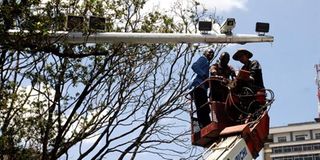CCTV should not replace police in our system

CCTV cameras are installed on Kimathi Street in Nairobi on November 1, 2013. The Sh400 million CCTV cameras installed in Nairobi’s city centre are of poor quality and cannot be relied on, a report has revealed. FILE PHOTO | SALATON NJAU |
What you need to know:
- Pros and cons: While they may deter criminals by themselves they do very little and are prone to tampering.
In recent weeks, we have seen how CCTV camera recordings revealed how a toddler was molested by a house maid in Uganda.
Just a few weeks ago, there was anger and anxiety across the country when the CCTV cameras in Nairobi’s central business district reportedly failed to capture the killing of Kabete MP George Muchai.
Many believe the cameras went to sleep as soon as they were installed.
This begs the question — are we investing too much hope in this technology?
In preventing crime, a CCTV system is not a physical barrier. It does not limit access to certain areas, make an object harder to steal, or a person more difficult to assault and rob. This does not mean it is not an example of a crime prevention tool.
CCTV seeks to change the offender’s perception so the offender believes that if he commits a crime, he will be caught.
In other words, CCTV aims to increase the perceived risk of capture, a factor which, assuming the person is behaving in a rational manner, will de-motivate the potential offender.
On the other hand, criminals may use surveillance cameras to monitor the public.
For example, a hidden camera at an ATM can capture people’s PINs as they are entered without their knowledge.
The devices are small enough not to be noticed and are placed where they can monitor the keypad of the machine as people enter their PINs.
Images may be transmitted wirelessly to the criminal.
DISPLACES CRIME
Opponents of CCTV point to the loss of privacy when it is installed in homes or public places and the negative impact of surveillance on civil liberty.
Furthermore, they argue that CCTV displaces crime, rather than reducing it.
Instead of a reduction in offences, you may see offenders react by moving their occupation to a place out of sight of the CCTV cameras.
What we need at crime zones are working cameras monitored around the clock.
We need to invest in the latest technology if we are to reap its benefits.
For example, more effective cameras that have the facial recognition facility is what we need at notorious crime zones.
Facial recognition is a computer application for automatically identifying or verifying a person from a digital image or a video frame from a video source.
These systems do not observe people directly. Instead, they track their behaviour by looking for particular types of body movements, or particular types of clothing or baggage.
This type of system has been proposed to compare faces at airports and seaports with those of suspected terrorists or other undesirable entrants and capture them before they get into the country.
Computerised monitoring of CCTV images is under development so that a human CCTV operator does not have to endlessly look at all the screens, allowing an operator to observe many more CCTV cameras.
ARE VULNERABLE
Unless physically protected, CCTV cameras have been found to be vulnerable to a variety of tactics. Some people will deliberately destroy cameras.
To make it harder to tamper with the cameras, some come with dust-tight, pressurized, explosion proof, and bullet-resistant housings.
Spraying substances over the lens can make the image too blurry to view.
Is CCTV the best option? Cameras can provide surveillance of an area, but they won’t t necessarily act as a replacement for police officers as they cannot offer the same range of services an officer can provide.
Furthermore, implementation times can be significant: not only does it take time to requisition and install cameras, but operating procedures, space allocation, and staffing arrangements can be time-consuming and costly.
CCTV is not a short-term fix but an ongoing commitment to the long term.
Sam Wambugu is a monitoring and evaluation specialist. Email: [email protected]





